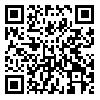مجله رویش روانشناسی از دادن گواهیهای کاغذی معذور است. لطفا تقاضا نکنید. همه گواهی ها در صفحه شخصی کاربران موجود است.
year 14, Issue 8 (atuomn 2025 2025)
Rooyesh 2025, 14(8): 29-40 |
Back to browse issues page
Download citation:
BibTeX | RIS | EndNote | Medlars | ProCite | Reference Manager | RefWorks
Send citation to:



BibTeX | RIS | EndNote | Medlars | ProCite | Reference Manager | RefWorks
Send citation to:
Mohammadi L, Akhavan Tafti M, Hashemi Z. (2025). Characteristics and Roles of a Transformative Teacher: A Meta-Synthesis Study. Rooyesh. 14(8), 29-40.
URL: http://frooyesh.ir/article-1-6044-en.html
URL: http://frooyesh.ir/article-1-6044-en.html
1- PhD Student of Educational psychology, Department of Educational psychology, Faculty of Education and Psychology, Alzahra University, Tehran, Iran.
2- Professor, Department of Educational psychology, Faculty of Education and Psychology, Alzahra University, Tehran, Iran. ,makhavan@alzahra.ac.ir
3- Associate Professor, Department of Educational psychology, Faculty of Education and Psychology, Alzahra University, Tehran, Iran.
2- Professor, Department of Educational psychology, Faculty of Education and Psychology, Alzahra University, Tehran, Iran. ,
3- Associate Professor, Department of Educational psychology, Faculty of Education and Psychology, Alzahra University, Tehran, Iran.
Abstract: (465 Views)
The present study aimed to determine the characteristics and roles of a transformative teacher. The research method was applied and qualitative, conducted using the meta-synthesis approach. The scope of this study encompassed research articles published between 1998 and 2025. Employing a purposive approach until saturation was achieved and utilizing an integrative perspective and the meta-synthesis model of Sandelowski and Barroso’s (2007), a total of 29 articles (out of 134 initially reviewed articles) were included in the final analysis stage. Qualitative data were analyzed in the form of primary and secondary codes, intermediate and main categories, using the Atlas software. The Kappa index value in this study was 0.89. the result revealed that the transformative teacher is defined by the categories of facilitation (effective guidance, organizing learning, optimizing the learning process, and creating learning opportunities); transformative thinking (flexibility, experience-based learning, transformation, self-change, agency, influencing others, and change agency); creating a transformative environment (security, trust, and peace; learning stimulation; relationship management; being a role model, and motivation); and learner-centered approach (anhancing critical thinking, innovation-driven learning, skill- based learning, and learner focus). Consequently, based on the identified main and intermediate categories, it is possible to redefine the teacher’s role at an operational level and bring about effective change in teacher training systems.
Type of Article: Qualitative article |
Subject:
Educational Psychology
Received: 2025/02/16 | Accepted: 2025/03/13 | ePublished: 2025/11/1
Received: 2025/02/16 | Accepted: 2025/03/13 | ePublished: 2025/11/1
Send email to the article author
| Rights and permissions | |
 |
This work is licensed under a Creative Commons Attribution-NonCommercial 4.0 International License. |





